Colette Beaune (born 1943 in Chailles, Loire-et-Cher) is a French historian and professor emeritus at the University of Paris X - Nanterre.
Contents

Colette Beaune (born 1943 in Chailles, Loire-et-Cher) is a French historian and professor emeritus at the University of Paris X - Nanterre.

Beaune was born in the town of Chailles, located in the department Loire-et-Cher, in 1943. She developed a passion for the study of Joan of Arc while reading the entirety of the documents related to Joan's trial during her second year of preparatory courses at her high school, the Lycée Molière, in Paris. She continued her studies at the École normale supérieure and received her agrégation for History in 1966. Her thesis for her habilitation, which she defended in 1984, was published in 1985 as La Naissance de la nation France. Initially a maître de conférences (a type of lecturer) at the University of Paris I - Sorbonne from 1985-1992, she spent the majority of her career as a professor at the University of Paris X - Nanterre (1992–2005).
Her research is primarily devoted to political history and women of France in the late Middle Ages. She is considered one of the leading experts on Joan of Arc.[ citation needed ]
Her books include:
Her recent articles are on such topics as royal identity in 15th-century France and medieval women's libraries.
She received the Prix du Sénat du Livre d' Histoire (Senate Prize for Best History) from the French Senate for Jeanne d' Arc (2004). In 2012, she was awarded the Grand prix Gobert by the Académie française for her work as a whole. [1]
In mid 2007, the French channel Arte filmed several interviews with renowned French historians, including Beaune, for the documentary Vraie Jeanne , fausse Jeanne , directed by Martin Meissonier. About a year after the filming, respondents found that the documentary was based on the sensational theories advocated by Marcel Gay and Roger Senzig in the book L' Affaire Jeanne d' Arc ; [2] the historians interviewed had been unaware of this when approached to participate in the project. In response, Beaune updated her 2004 work on Joan of Arc to Jeanne d'Arc, vérités et légendes (Paris: Perrin, 2008) (Joan of Arc, Truths and Fictions).[ citation needed ]
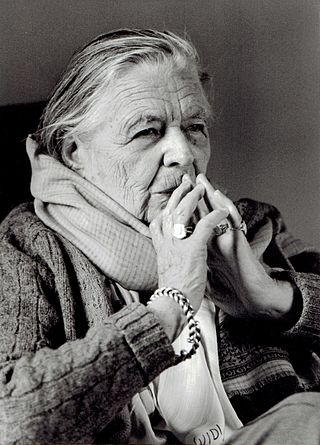
Marguerite Yourcenar was a Belgian-born French novelist and essayist who became a US citizen in 1947. Winner of the Prix Femina and the Erasmus Prize, she was the first woman elected to the Académie Française, in 1980. In 1965, she was nominated for the Nobel Prize in Literature.

Jeanne Laisné, also known as Jeanne Fourquet in the 16th century and better known as Jeanne Hachette, is an emblematic figure in the history of the French city of Beauvais's resistance to the siege laid by Charles the Bold, Duke of Burgundy. She is said to have helped to repel a Burgundian attack on the town of Beauvais with a hatchet and, in popular history, has been elevated to the rank of French heroine. She was born in Beauvais, around 1454, and died on an unknown date. The details of her life, and even the fact of her existence, have been the subject of debate among historians, although several contemporaneous documents refer to her existence.

Jargeau is a commune in the Loiret department in north-central France.

Florence Delay is a French writer. She has been a member of the Académie française since 2000. She has notably written novels, essays and plays and has translated texts from Spanish.
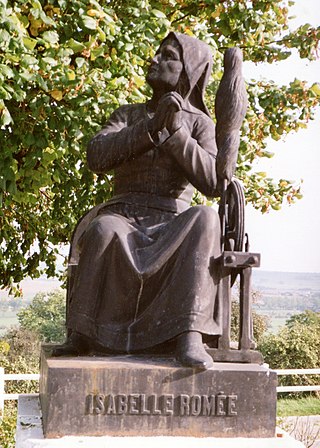
Isabelle Romée, also known as Isabelle de Vouthon and Isabelle d'Arc (1377–1458) and Ysabeau Romee, was the mother of Joan of Arc. She grew up in Vouthon-Bas and later married Jacques d'Arc. The couple moved to Domrémy, where they owned a farm consisting of about 50 acres (200,000 m2) of land. After their daughter's famous exploits in 1429, the family was granted noble status by Charles VII in December of that year. Isabelle moved to Orléans in 1440 after her husband's death and received a pension from the city. She petitioned Pope Nicholas V to reopen the court case that had convicted Joan of heresy, and then, in her seventies, addressed the opening session of the appellate trial at Notre Dame cathedral in Paris. The appeals court overturned Joan's conviction on 7 July 1456. Isabelle died two years later, probably at Sandillon near Orléans.
Pierronne, also known as Pierrone, Pierronne la Bretonne and Perrinaïc, was a Breton woman who said she saw visions of "God dressed in a long white robe with a red tunic underneath". Pierronne, who may have met Joan of Arc in 1429, tried to defend her reputation at Corbeil. For this, Pierronne was arrested by pro-English authorities in March 1430 and burned at the stake.

Gilles de Rais, Baron de Rais, was a knight and lord from Brittany, Anjou and Poitou, a leader in the French army during the Hundred Years' War, and a companion-in-arms of Joan of Arc. He is best known for his reputation and later conviction as a confessed serial killer of children.
Pierre d'Arc (1408–1467) was a French soldier whose place in history is due to his service in the army made famous by his younger sister Joan of Arc.

Jean d'Aulon (1390–1458) was a French knight and lord best known for serving alongside Jeanne d'Arc as her soldier, steward, bodyguard, and squire. Some sources incorrectly attribute the role of d'Arc's bodyguard to Gilles de Rais. d'Aulon was an avid and detailed journaler and his records, considered to be honest and straightforward, set the foundation for what we know about Jeanne d'Arc, including her apparent amenorrhea.
Régine Pernoud was a French historian and archivist. Pernoud was one of the most prolific medievalists in 20th century France; more than any other single scholar of her time, her work advanced and expanded the study of Joan of Arc.

The conviction of Joan of Arc in 1431 was posthumously investigated on appeal in the 1450s by Inquisitor-General Jean Bréhal at the request of Joan's surviving family—her mother Isabelle Romée and two of her brothers, Jean and Pierre. The appeal was authorized by Pope Callixtus III.

Joan of Arc is a 1922 cast of Paul Dubois's 1889 statue of Joan of Arc, located at Meridian Hill Park in Washington, D.C., United States of America. Joan of Arc was originally surveyed as part of the Smithsonian's Save Outdoor Sculpture! survey in 1994.
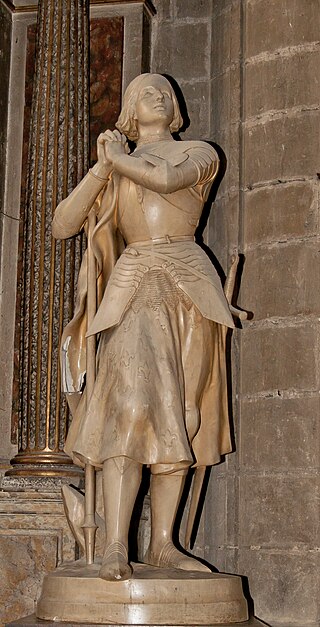
Charles Desvergnes (1860–1928) was a French sculptor.
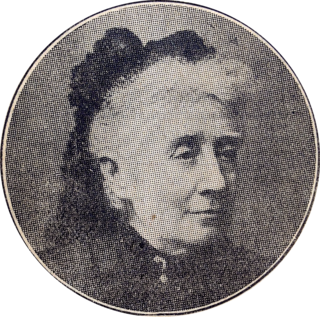
Marie Maugeret (1844–1928) was a French novelist and conservative Catholic who became a feminist and was active in promoting Christian feminism as an antidote to socialism.

After the French lifted the siege of Orléans and won a decisive victory at the Battle of Patay, the English and Burgundians no longer posed a threat. Joan of Arc convinced the Dauphin Charles to go to Reims for his coronation. Successfully marching their army though the heart of territory held by the hostile Burgundians solidified the Dauphin’s regrasp of the throne of France. He had been disinherited from it through the Treaty of Troyes.

Louis de Robert was a French writer, winner of the prix Femina in 1911.

Colette Yver was a French Roman Catholic writer from Normandy, the winner of the 1907 Prix Femina for her work Princesses de science.
Hortense Dufour is a French writer. She spent her childhood and youth in Marennes, Charente-Maritime.
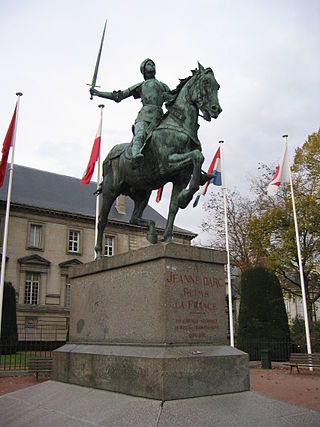
Joan of Arc is a monumental bronze sculpture by French sculptor Paul Dubois. It depicts Joan of Arc both as a warrior and as a divinely inspired visionary.
Le Journal d'un bourgeois de Paris is an account of politics, war and everyday life in Paris covering the period between 1405 and 1449. The exact identity of its author is unknown. It has long been acknowledged as an invaluable source of information on the life and times of the city of Paris in the first half of the 15th century, a period marked by the Hundred Years' War and the English occupation of part of the kingdom of France.